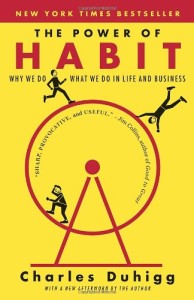The Power of Habit: Why We Do What We Do in Life and Business takes you behind how baits work. There is a reason why everything you do, whether it is starting a new diet, going for a walk, or just rising up early, fro at least 7 to 10 days. To form a habit. Habit is that powerful tool that drives most of what you do in life. Thankfully, like genes, it is not cast in stone. If you can form habits, you can change habits.
In The Power of Habit: Why We Do What We Do in Life and Business, New York Times bestseller, author Charles Duhigg shows you how human natures works and gives you enough proof to believe that you can change any damaging habits that you may have picked up over the years.
Charles Duhigg is a New York Times reporter and had won explanatory reporting Pulitzer Prize for his series on Apple – The iEconomy. A native f New Mexico, he has studied History at Yale and is a Harvard MBA.
 The Power of Habit: Why We Do What We Do in Life and Business
The Power of Habit: Why We Do What We Do in Life and Business
Author: Charles Duhigg
Paperback: 371 pages
Publisher: Random House Trade Paperbacks (January 7, 2014)
ISBN: 081298160X, 978-0812981605
The Power of Habit Summary
The author begins by first explaining how habits work and how they are formed. He then digs deeper to explain you the physiological forces that form a habit. It is all in your head. And the root cause is more or less the same as it is for any of your other actions – Risk and Reward. The author explains that any set of actions that you register as reward is remembered by the brain and then develops into a habit. The same mechanism that teaches you as a kid not to touch what appears red and hot – to avoid a burn. Only, in this case the risk and reward may not just be physical. The author also talks about emotional rewards.
After explaining what it is and how it is formed he explains his readers what is essential to undo what has been done and to effectively create new habits. Chapter 2 teaches you how you can form new habits by creating your own cue-reword loops.
Cue –> Action (routine) –> Reward
The mantra in The Power of Habit: Why We Do What We Do in Life and Business is to keep old cues and rewords and change what’s in between. By adding a new routine to the Action part, you can slowly replace the old, harmful routine with a new one and keep getting the same reward.
After explaining the mechanism and how to apply the science for individual benefit, the author movies on to explaining how the same principles can work for organizations and entire societies. In an easy-to-understand words and multiple examples for each type, the book makes it easy for you to determine you own new routines.
Habits are never erased. Once encoded, your habit will always remain in your head. But by forming new ones and reinforcing them, you will have stronger routines that will push back the old, harmful ones.
The Power of Habit Audience Reviews
More than fifty percent readers on various web sites rate the book as an amazing read. Most readers find the book easy to read and like that the authors claim are supported with research. However, more Psychology inclined readers compare the book to those written by Doctors and researchers and find that the author does not have as much grasp on the topic as them.
Overall, if you are not really interested in whats happening in the chemicals of your brain and more interested in the application of that research, the book gives enough explanation to root it in science. Its strength comes from communicating the important parts through stories rather than a dry scientific narrative.
The Power of Habit Critics Reviews
“Charles Duhigg’s “The Power of Habit” accomplishes what few books are able to do: educate (it’s a serious look at the science of habit formation and change) while being entertaining (filled with incredible stories). It’s thoroughly enjoyable and provided many “ah ha” moments.”
~ Larry Swedroe, CBS Money Watch
Duhigg sometimes oversimplifies his explanations and some examples, such as the Montgomery bus boycott in 1955, seem to strain credibility a bit. But by and large, the anecdotes are entertaining and the book just may give you a few ideas about how to change some ideas of your own.
~ Thomas H. Maugh II, Los Angeles Times